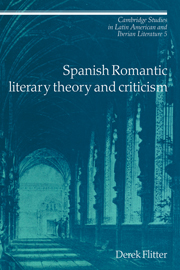Book contents
- Frontmatter
- Contents
- Preface
- List of abbreviations
- Introduction
- 1 Böhl von Faber and the establishment of a traditionalist Romanticism
- 2 The consolidation of Romantic ideas: 1820–1833
- 3 The exiles, liberal Romanticism and developments in criticism
- 4 Condemnation and clarification in the literary debate
- 5 Reaffirmation of Schlegelian principles in literary criticism
- 6 The religious spirit in literary ideas and the influence of Chateaubriand
- 7 The perception of literature's rôle in society
- 8 Romantic traditionalism in the work of Fernán Caballero
- 9 Conclusions: The mid-century
- Notes
- Bibliography
- Index
5 - Reaffirmation of Schlegelian principles in literary criticism
Published online by Cambridge University Press: 02 November 2009
- Frontmatter
- Contents
- Preface
- List of abbreviations
- Introduction
- 1 Böhl von Faber and the establishment of a traditionalist Romanticism
- 2 The consolidation of Romantic ideas: 1820–1833
- 3 The exiles, liberal Romanticism and developments in criticism
- 4 Condemnation and clarification in the literary debate
- 5 Reaffirmation of Schlegelian principles in literary criticism
- 6 The religious spirit in literary ideas and the influence of Chateaubriand
- 7 The perception of literature's rôle in society
- 8 Romantic traditionalism in the work of Fernán Caballero
- 9 Conclusions: The mid-century
- Notes
- Bibliography
- Index
Summary
While Edgar Allison Peers had viewed Romanticism as a purely literary phenomenon, Angel del Río felt that this limited perspective necessarily rendered Peers's interpretation of events untrustworthy. He based his own analysis upon a distinction between liberal and conservative romanticisms, regarding the former as the only genuine manifestation of Romanticism in Spain. Del Río claimed that this authentic Romanticism constituted a sudden and total reaction in the early 1830s. He saw the survival of a conservative Romanticism after 1840, with its restoration of the literature of the Golden Age and embodiment of the national tradition, as evidence of an enforced change of direction in the face of reactionary external pressures, as a break with the movement's origins caused by ‘the impossibility that the new ideas, the new interpretation of the world, the new revolutionary and unorthodox philosophy of romanticism, could take root in the orthodox and catholic soil of Spain’. D.L. Shaw would subsequently bolster Del Rio's theory in two articles that encompassed moral and social preoccupations as well as developments in literature. Disavowing the thesis that Romanticism was a purely literary movement in isolation from a broader context, Shaw felt the problem of its origin and definition to be closely connected with the collapse of one traditional world-view and its replacement by another, with concomitant changes in all categories of value.
- Type
- Chapter
- Information
- Spanish Romantic Literary Theory and Criticism , pp. 92 - 112Publisher: Cambridge University PressPrint publication year: 1991



